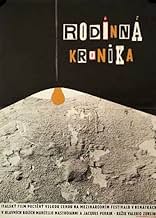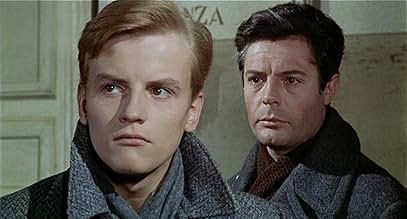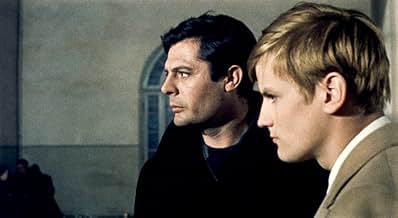IMDb RATING
7.2/10
1.2K
YOUR RATING
A man recalls the life of his late younger brother.A man recalls the life of his late younger brother.A man recalls the life of his late younger brother.
- Awards
- 5 wins & 3 nominations total
Angelo Casadei
- Un visitatore all'ospedale
- (uncredited)
Featured reviews
I watched this on TCM and there was something wrong. when Enrico thinks about his brother in voice over, (as if he is writing an autobiography,) instead of Marcello's voice, some idiot dubbed in a ridiculous American actor's voice. firstly, the dubbed voice is all wrong in tone...it's as if the actor were from Car54 or Dragnet, and secondly, the voice reads the lines in the third person, often with bad translation!!!
So you have Enrico remembering his brother, and relating his recollections to the audience in the first person, but you have a voice over going "Enrico says", and "Enrico thinks",...it's a travesty.
This film is somewhat too sentimental, and slightly overwrought, but it has touching and truthful scenes as well. too bad that just when you become involved, some American butchery intrudes. 6/10.
So you have Enrico remembering his brother, and relating his recollections to the audience in the first person, but you have a voice over going "Enrico says", and "Enrico thinks",...it's a travesty.
This film is somewhat too sentimental, and slightly overwrought, but it has touching and truthful scenes as well. too bad that just when you become involved, some American butchery intrudes. 6/10.
In 1945, Enrico Corsi (Marcello Mastroianni) receives news of his younger brother Lorenzo's death. He recalls their earlier lives. Their mother had died from complications giving birth to Lorenzo. With their father sick, Lorenzo was raised by an English baron's butler as a gentleman while Enrico was raised by their poor grandmother. Next, they run into each other in 1935. They have been estranged from each other and from their sick father. History is recounted as they come to terms with their brotherhood. Enrico has the drive from his poverty. Lorenzo has no ambition and struggles to find a steady job. His pretty face is not enough. He joins medical trials and falls ill.
Whether it's Enrico's narration or the dialogue, everything is in a hush tone. It is a sad grinding descend. It's a little distancing especially when we're told about his bad marriage but never meet his wife. There are a lot of talking but it feels melodramatic. Mastroianni remains a master. I don't think I can stay with this movie without him.
Whether it's Enrico's narration or the dialogue, everything is in a hush tone. It is a sad grinding descend. It's a little distancing especially when we're told about his bad marriage but never meet his wife. There are a lot of talking but it feels melodramatic. Mastroianni remains a master. I don't think I can stay with this movie without him.
I wept like I hadn't wept in a movie for years. Director Valerio Zurlini and his cinematographer Giuseppe Rotunno gives us a visual symphony in browns and dark yellows. The faces of the brothers Enrico and Lorenzo played with shattering truth by Marcello Mastroianni and Jaques Perrin have made a home in my brain. Their reunion with their grandmother, played by the sublime Sylvie, is an image, a film moment that I shall never forget. As it happens more often than not, the Italians have released this gem in DVD without English subtitles - not in English or any other language for that matter. I'm grateful for speaking and understanding Italian well enough to enjoy this movie to the fullest. If you do as well, I recommend it wholeheartedly.
In war-ravaged Italy, tubercular journalist Marcello Mastroianni (as Enrico) learns little brother Jacques Perrin (as Lorenzo) has passed
In flashback, we learn the brothers were separated upon the death of their mother, and led different lives. They are reunited as estranged adults, grow to love each other as brothers, and are again separated by death. The co-starring lead actors give it all the believability they can muster - which, when you have Mastroianni and Perrin acting, is considerable - but, there is a noticeable age difference, they never look deathly ill, and are each distractingly handsome. As a result, they often seem more like lovers than brothers. Shameless as ever, Sylvie (as Grandmother) claims it's "easy to see" that they are brothers. Well, okay. Director Valerio Zurlini and cameraman Giuseppe Rotunno make this English-retitled "Family Diary" look amazingly beautiful - herein, a old radiator against a stark wall is a work of art. They, and the haunting performances, do make it worth watching.
******* Cronaca familiare (9/62) Valerio Zurlini ~ Marcello Mastroianni, Jacques Perrin, Sylvie, Salvo Randone
******* Cronaca familiare (9/62) Valerio Zurlini ~ Marcello Mastroianni, Jacques Perrin, Sylvie, Salvo Randone
10Aw-komon
Phew! What a beautiful film! I'd rank this as one of the most awe-inspiringly composed and photographed color films of all time. You've never seen Mastroianni, until you've seen him in this film, walking around like an iconic black ghost in the darkly hued existentialist-to-the-nth-degree technicolor universe of post-war Italy created by Zurlini and legendary DP Giussepe Rottuno. What a stroke of genius to contrast the bleakest and most depressing of subjects possible with the most fantastically poetic and gorgeous technicolor cinematography this side of `Black Narcissus.' This is one of Rottuno's finest works ever: full of absolutely breathtaking deeper than deep blacks and colors that seem to have sprouted from some otherworldly weathered, neo-realist hallucination. And what timeless subtly paced, unerringly poetic, intelligent and completely uncompromising direction by Zurlini, the forgotten genius of Italian cinema, whose style in this film can be roughly described as a unique melange of neo-realism, Antonioni, Michael Powell, Jacques Becker, early Pasolini and early Bertolucci. It's easy to imagine how easily this story of a tubercular writer grieving the death of his younger brother through a series of flashbacks could've turned into not much more than a melodramatic tearjerker; yet in Zurlini's hands and through the incredible, tour-de-force performance of Marcello Mastroiani in the lead role, the Marxist-proleteriat-plight-of-the-poor sentimentality at the film's core transcends itself and becomes a deeply affecting, painful and ultimately cathartic meditation on death, despair, and the possibilities of redemption in the direst of circumstances.
Did you know
- TriviaJacques Perrin had already played a boy named Lorenzo in the previous movie by Valerio Zurlini, "Girl with a Suitcase"
- GoofsIn the later sequence in the hospital, there are hairs on the film in several scenes.
- ConnectionsReferenced in Close-Up: Why do We Need the Venice Film Festival? (2024)
Details
- Runtime1 hour 53 minutes
- Sound mix
- Aspect ratio
- 1.85 : 1
Contribute to this page
Suggest an edit or add missing content

























